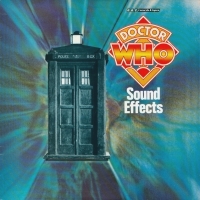| Track # | Artist | Track name | Stories used in |
|---|
| 1 | Dick Mills | "The Central Control Room in Exxilon City" | Death to the Daleks (Dr. Who and the Exillons) |
| 2 | "The Dalek Control Room" | Death to the Daleks |
| 3 | "Metebelis III Atmosphere" | Planet of the Spiders |
| 4 | "Styre's Scouting Machine (Approach, Stop, Search, Depart)" | The Sontaran Experiment (The Destructors) |
| 5 | "Dalek Hatching Tanks on Skaro" | Genesis of the Daleks |
| 6 | "Zygon Spaceship Control Centre" | Terror of the Zygons (Dr. Who and the Zygons) |
| 7 | "Sutekh Time Tunnel" | Pyramids of Mars (Pyramid of Mars) |
| 8 | "The Interior of Xoanon" | The Face of Evil |
| 9 | "The Shrine of the Sisterhood of Karn" | The Brain of Morbius (Dr. Who and the Brain of Morbius) |
| 10 | "Kraal Disorientation Chamber" | The Android Invasion |
| 11 | "The Mandragora Helix" | The Masque of Mandragora (The Curse of Mandragora) |
| 12 | "Atomic Reactor Runs Wild" | The Hand of Fear |
| 13 | "Wind-Mine Machine" | The Robots of Death |
| 14 | "Distillation Chamber" | The Talons of Weng-Chiang |
| 15 | "Cloning and Miniaturisation Process" | The Invisible Enemy (The Enemy Within) |
| 16 | "Inside Dr. Who's Mind" |
| 17 | Brian Hodgson | "TARDIS Interior (In Flight)" | various |
| 18 | "TARDIS Interior (Stationary)" |
| 19 | "TARDIS Observation Screen Operates" |
| 20 | "TARDIS Door Opens" |
| 21 | "Sonic Screwdriver" |
| 22 | Dick Mills | "Fission Gun (2 Blasts)" | The Ark in Space |
| 23 | "Tesh Gun" | The Face of Evil |
| 24 | "Gallifreyan Staser Gun (3 Blasts)" | The Deadly Assassin |
| 25 | "Vardan Gun" | The Invasion of Time |
| 26 | "Sontaran Gun (3 Blasts)" |
| 27 | "Gallifreyan Staser (3 Blasts)" |
| 28 | "Dematerializer Gun (Switch on and Fire)" |
| 29 | "Dalek Gun (3 Blasts)" | Genesis of the Daleks |
| 30 | "Dragon Ray-Gun" | The Talons of Weng-Chiang |
